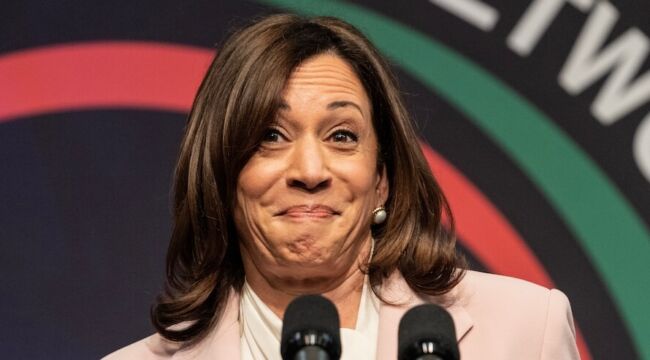Why Inflation is Killing Kamala
Inflation is so universally despised that its mere mention evokes fear, uncertainty, and, most importantly, anger.
Wanna piss off an entire country? Make things expensive there.
Beyond its textbook definition, inflation lights up deep emotional, social, and psychological layers that explain why people hate it so much.
Let’s be honest. Kamala would be having a much easier time if her boss had not opened the fiscal spigot to the point where many couldn’t afford to buy the necessities.
Between her interviews, speeches, and town halls, Kamala is getting skewered even by her friends. CNN is the latest outlet to hammer her.
Her Townhall
Kamala repeatedly hammered Trump, but CNN was unconcerned about that.
If Trump wins, Harris said, “He’s going to sit there, unstable and unhinged, plotting his revenge, plotting his retribution, creating an enemies list.”
If that isn’t the biggest reason to vote for Trump, I don’t know what is.
She said, “My administration will not be a continuation of the Biden administration,” Harris said. “I bring to this role my own ideas and my own experience. I represent a new generation of leadership on a number of issues and believe that we have to actually take new approaches.”
Uh, Kamala is 59 years old and previously said she wouldn’t change anything on The View.
“I traveled this state and others with Liz Cheney. She has endorsed me.”
“Dick Cheney is voting for me. [Over 400 members of previous members of] Republican administrations have endorsed my candidacy, and the reason why – among them is a legitimate fear based on Donald Trump’s words and actions, that he will not obey an oath to support and defend the Constitution of the United States.”
The more Kamala says things like that, the more people vote for Trump. I have no idea why she’s trotting out anyone whose surname is Cheney.
But her biggest blunder was on the border.
When Anderson Cooper asked her if she wanted to “build the wall,” Kamala replied, “I want to strengthen our border.”
When Cooper pressed her, she decided to make fun of Trump, to no avail.
From CNN’s own fact-checking team:
At CNN’s town hall with Kamala Harris on Wednesday, the vice president claimed that only 2% of the US-Mexico border wall was built during former President Donald Trump’s administration.
“How much of that wall did he build? I think the last number I saw was about 2%,” she said.
Facts First: This claim is exaggerated. According to a 2021 report from the US Customers and Border Protection and the Army Corps of Engineers, nearly 52 miles of “new primary wall” and 33 miles of “new secondary wall” were built during the Trump presidency. More than 370 miles of broken-down or outdated primary and secondary wall was also replaced.
During his campaign and throughout his presidency, Trump pledged to build a wall with parameters evolving from 1,000 miles to over 500 miles. Using the “new primary wall” numbers from the 2021 report, one could estimate that 5.2% of his 1,000-mile promise was met or 10.4% of his 500-mile goal was completed.
Harris’ running mate, Gov. Tim Walz, made a similar claim earlier this month at the CBS vice presidential debate.
The entire US-Mexico border is roughly 2,000 miles. The 52 miles of new primary wall would amount to 2.6% of that total length, but as CNN has previously reported, Trump had pledged to build more wall, not a new wall across the entire southern border.
Wow. Even CNN isn’t carrying her water.
And why is that? I genuinely think it’s because America blames her, or at least her part in the Biden Administration, for the inflation they’ve suffered.
The Erosion of Purchasing Power
I vividly remember my grandfather telling me his movie popcorn was “only 5 cents a bag!” Mine cost $5 a bag at the time. I remember thinking, “Well, my popcorn must be much better…”
How naive I was! The popcorn wasn’t better or worth more. The stuff I used to buy the popcorn – the dollar – was worth less.
At the heart of why inflation is so deeply unpopular is its erosion of purchasing power. Even now, while the inflation rate has fallen, prices are still high!
For the average consumer, inflation means that a fixed amount of money buys fewer goods and services over time. For old folks on a fixed income, it can mean a miserable, miserly retirement.
Whether at the supermarket, the gas station, or online, rising prices chip away at your wallet, sometimes subtly, other times dramatically.
We, The People, generally expect – and demand – from The State a steady, predictable relationship between our income and spending ability. But when inflation accelerates, it distorts this balance. Suddenly, household budgets become pressured as wages fail to keep pace with rising costs. Essentials like food, fuel, and housing become prohibitively expensive.
The Hidden Tax
We refer to inflation as a “hidden tax,” and for good reason. When inflation rises, the real value of money decreases. Governments benefit from inflation, particularly if they carry large debt loads, because it allows them to repay those debts with cheaper money. But for everyday people, inflation is a stealthy force that eats away at savings, reducing the value of their hard-earned wealth without any formal tax increase.
Inflation feels particularly invasive when wages don’t rise. You’re still working the same hours, but your paycheck buys you less and less each month. Over time, inflation diminishes the returns on savings accounts, making it harder for people to accumulate wealth or plan for future expenses like education or retirement.
What compounds this feeling is that inflation isn’t as obvious, unlike a direct tax. There’s at least a transparent relationship with taxes—you know how much you’re being taxed and can make decisions accordingly. Conversely, inflation is less tangible but more damaging to your financial health. People feel cheated when they realize that the money they’ve saved or the fixed wages they’ve been earning are worth significantly less in real terms.
The Psychology of Uncertainty
People hate inflation not just because of what it does to prices but also because of its uncertainty. Stable prices allow people to plan for the future with confidence. But inflation injects an element of unpredictability into everyday life. When prices rise at unpredictable rates, it becomes difficult to budget, save, and make long-term decisions.
Think about someone planning to buy a home, pay for a child’s education, or save for retirement. Inflation throws these plans into disarray. Today’s savings goal might fall short in a few years if inflation continues to eat away at the purchasing power of their savings.
This uncertainty also affects businesses, which pass on higher costs to their customers. Companies facing higher input costs must decide whether to absorb them (reducing their profitability) or pass them on through higher prices. Both scenarios can lead to job losses, reduced wages, or further price increases, creating a feedback loop perpetuating inflation’s grip on the economy.
The Destruction of Trust
When inflation runs high, it erodes trust in institutions—particularly governments and central banks, who frankly deserve the downgrade. People depend on these institutions to maintain economic stability. When the Fed, for instance, gets behind the curve, it signals a failure on their part.
Take the hyperinflation experienced by countries like Venezuela or Zimbabwe. In these instances, the government’s mishandling of the economy resulted in extreme price increases, and people lost faith in the currency and the institutions meant to safeguard the economy.
Prolonged inflation, especially in more developed economies, makes people question policymakers’ competence. The recent inflationary surge following the COVID-19 pandemic, driven by supply chain disruptions, government spending, and central bank monetary policies, has led to widespread criticism. People rightly expect the Federal Reserve to maintain price stability. When it fails, trust erodes, and it’s incredibly hard to rebuild quickly, if at all.
Wrap Up
It’s no wonder inflation is so universally despised. At its core, inflation strikes at some of the most fundamental aspects of financial well-being: purchasing power, savings, and the ability to plan for the future. It acts as a hidden tax, erodes trust in institutions, and exacerbates inequality by hitting the most vulnerable hardest.
For most people, inflation represents a loss of control over their finances, plans, and economic future. It creates a feeling of instability and insecurity that transcends economic theory and hits everyday life.
Under Biden/Harris, inflation changed America from a middle-class paradise to a middle-class nightmare. Because of this, Kamala is having a helluva time shaking it off.



Comments: